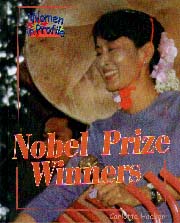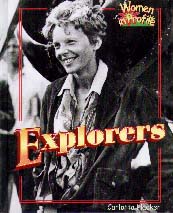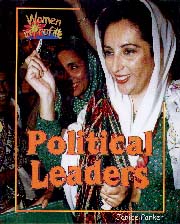|
________________
CM . . . .
Volume V Number 13 . . . . February 26, 1999
This is a collection of six titles focussing on women who have made names for
themselves in fields where women have typically been excluded or not welcomed.
They are Explorers, Political Leaders, Scientists, Writers, Nobel Prize
Winners and Musicians. There is once more book, Writers,
which is not reviewed here.
Each book outlines the lives of six prominent women in each field, with more
than 10 others described more briefly at the end of the book. Six pages are
devoted to each woman, with her life being divided up between Early Years,
Developing Skills and Accomplishments. Backgrounders, Quick Notes and Key
Events list supplemental information, and full colour photographs decorate the
pages, as do quotes that reflect the subject's philosophy of life or the
opinions of other notable people. There is an introduction, a glossary of terms
explaining words that are printed in bold type throughout the text, a Suggested
Reading list and an index, all found at the end of the book.
The books are written in a simple style to explain complicated information to a
younger reader:
However, the need to explain something simply should not prevent the authors
from being complete and accurate. The perception of most readers is that these
women have been highlighted because they have made positive contributions to
their fields or to society. The promotional material accompanying the series
"celebrates twentieth-century women who have made significant achievements..."
The expectation of young women looking for role models is that women add a more
humane face to leadership, science or other fields, that women are somehow
"better" or "different" than men. The profiles of many of these women leave out
or gloss over important information that would inform malleable minds that many
of these women are not positive role models but are as no different that men
engaged in the same activities and should be identified as such. Either the
authors want to keep information from the intended audience, or they do not
believe that children are capable of understanding difficult concepts. Reality
proves that perception to be wrong on a daily basis. Children living in
countries where corruption reigns, where military dictatorships or fascism
exists understand these concepts. Children who have never experienced many of
these terrible things may need more explanation to understand how bad people
can actually be to each other, but they are capable of understanding it. Adults
are often shocked at the lack of knowledge young people display about current
events, politics and history. If the young readers should be able to
understand words such as "suffragette," "racism" and "pacifist," then they
should also be able to understand such terms as "economic domination,"
"cronyism", "imperialism" and others. Books such as Political Leaders
and Explorers leave out important information that might discredit many
of these women as role models or provide a properly explained framework for the
reader to interpret the information.
If the publishers of this series want to be helpful to young impressionable
readers, it would be better if they presented more thorough biographies. There
are many women whose feminine side may have made them better at their skill,
better leaders and whose work has benefited the people in their country or
humanity in general. Those women should be celebrated. But there are many women
who are not distinguished by anything except their gender. If their
contribution has been negative, that should be stated, and not confused with
those women who deserve recognition. Teachers, teacher-librarians and parents
should examine each book in the series on its own merit.
Scientists outlines the contributions of Jocelyn Bell Burnell, Rachel Carson, Dian Fossey, Mary Leakey, Margaret Mead and Chien-shiung Wu, whose fields of study ranged from archaeology to primatology to physicist. The text outlines the influences their families had on the development of their ideas, how their skills advanced (sometimes in an atmosphere of male domination or resentment). A few of these women did not receive honour for their work that many thought they were due, and the suggestion is that their gender worked against them being recognized.
Recommended.
Musicians. Subject Heading: Musicians presents many contemporary artists, including some Canadian women of note. The women profiled are Liona Boyd (guitar), Midori (violin), Vanessa-Mae (violin), Mary O'Hara (Irish harp), Mary Lou Williams (jazz piano) and Ethel Smyth (composer). Included in the "More Women in Profile" section is cellist Ofra Harnoy and fiddler Natalie MacMaster. Several of these women displayed their talents as young children and developed them with the encouragement of their families. This book presents a well-rounded array of talents, from Ethel Smyth, whose gender probably held her back from being published and recognized as she should have been in her lifetime, to Mary Lou Williams whose jazz piano skills took her to the top in the '20's and '30's, and young violinist Vanessa-Mae whose full range of talent is yet unknown.
Recommended.
Nobel Prize Winners. Subject Headings:
The introduction to this book talks about the origin of the Nobel Prize. There
were few women prize winners in the early days of the Nobel Prize, because
there were few women scientists, and because the work or contribution of many
women in science has been undervalued or ignored. That situation has improved
in recent years, and this book highlights the awards given to women in areas of
science, writing and in the struggle for peace. They are Aung San Suu Kyi
(Burmese politician), Marie Curie (physicist), Nadine Gordimer (writer),
Barbara McClintock (geneticist), Toni Morrison (writer) and Mairead Corrigan
and Betty Williams (peace activists).
Barbara McClintock is one woman whose work was done at a time when women were
well not accepted in scientific circles. In 1931, Barbara had to give up her
position as instructor. Cornell (University) did not give permanent teaching
jobs to women, and it was not going to start with Barbara. Although Barbara was
one of the leading scientists in her field, she could not get full-time work to
continue her research.
Nobel Prize Winners provides a broad overview of women active on many
fronts who have achieved the highest level of recognition.
Recommended.
Explorers. Subject Heading:
Explorers
gives the reader a glimpse into the lives of women who have explored the depths
of Africa and the heights of space. From 19th century explorer Isabella Bird
Bishop to modern day explorer Freya Stark, and aviatrix Amelia Earhart and
Soviet astronaut Valentina Tereshkova, women have pursued their sense of
adventure and curiosity. Many defied contemporary conventions which did not
accept women travelling unaccompanied by a European male. Their method of
travel was often as difficult as those made by the hardiest of men, and all
made contributions to the store of knowledge and understanding of the world,
and contributed to the breaking down of gender barriers, at least in Western
countries. The book touches on the issue of colonialism, the resentment the
colonized peoples felt toward the colonizers and the condescending attitude of
the colonizers. But the author could develop this topic in a more thorough
manner to give students an accurate historical understanding of the objectives
of the colonizing countries and the consequences of their actions on the world.
This information would be found most suitably in the "Backgrounder" notes, as
is the information on "foreign devils." Recommended.
Political Leaders. Subject Headings:
The women leaders profiled in this book are Margaret Thatcher, Benazir Bhutto,
Indira Gandhi, Eva Peron, Golda Meir and Corazon Aquino. All of these women,
except for Peron, have served as the head of state in their respective
countries. The book deals with their early experiences, how and why they rose
to power, and what they did in power. What the book does not deal with
forthrightly is the controversy that surrounded each of them in office and
which made them no different than many male leaders.
For example, Margaret Thatcher is described as being "tough." Margaret Thatcher
was the woman who caused thousands of people to lose their jobs in the coal
industry, slashed the national health plan, refused to acknowledge the rights
of Irish prisoners - leading to the death of 10 men by starvation, led her
country to a good old-fashioned British imperialist-type war in the Falkland
Islands, and who, today, serves tea to former Chilean dictator Augusto
Pinochet. The book does not mention the economic or social impact of Margaret
Thatcher's policies on the British people. It has been documented. Is
she an example the author thinks young women should follow?
Eva Peron was the First Lady of Argentina. She is commonly known to have been a
prostitute and someone who milked the countries coffers when she married
dictator Juan Peron. She developed a cult following due to her willingness, not
her humanity. Her philanthropy was a good cover for her expensive taste. Her
most recent claim to fame is that a musical was made about her. Does that make
Eva Peron a woman who should be heralded?
Indira Gandhi was the first woman to lead India. She perpetuated the system of
corruption, cronyism and nepotism that plagued Indian politics. In the name of
beautifying the country, she razed slums, displacing hundreds of thousands of
people to live on the streets. Her social policy included rounding up men and
forcibly sterilizing them to control population growth. She incited the flames
of religious strife for years to come with the invasion of the Golden Temple at
Amritsar. She concentrated power in her own hands and declared martial law. She
trained her son to take over from her and to be as brutal and corrupt as she
was to stay in power. Are these accomplishments the author wants girls to
aspire to?
Using her father's name to gain popular support, Benazir Bhutto came to power
on the promise to rid Pakistan of corruption. She is now accused of using her
position as Prime Minister to amass a fortune, give her friends and family
favourable positions, and of being involved in the killing of her own brother,
a political rival. The book does not mention these exemplary activities.
Corazon Aquino and Golda Meir are also not without controversy attached to
their names. Aquino was brought to power because the US government supported
her - Ferdinand Marcos had lost all credibility, and, once in power, she was a
disappointment to the Filipino people. Golda Meir was Prime Minister of Israel
when there were great tensions with Arab countries, and her decisions were not
always popular.
If it is to be informative, a biography of political figures has to deal with
the whole gamut of issues. Presenting these women as examples, without full
disclosure of information, does a disservice to impressionable young readers.
Not recommended.
Harriet Zaidman is a teacher-librarian at Niakwa Place School in
Winnipeg, Manitoba.
To comment on this title or this review, send mail to cm@umanitoba.ca.
Copyright © the Manitoba Library Association.
Reproduction for personal use is permitted only if this copyright notice
is maintained. Any other reproduction is prohibited without
permission.
Published by
TABLE OF CONTENTS FOR THIS ISSUE - FEBRUARY 26, 1999.
AUTHORS |
TITLES |
MEDIA REVIEWS |
PROFILES |
BACK ISSUES |
SEARCH |
CMARCHIVE |
HOME
|

 Scientists.
Scientists.


